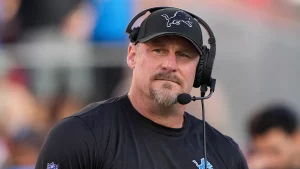
Everton’s owner, Farhad Moshiri, has always sounded extremely confident that he will be selling the Premier League club to the US investment firm 777 Partners. In October last year he told Sky Sports News: “The more time that I have spent with the 777 team, the more my confidence increases that we have found the right people to take the club forward in the modern era.”
That comment is ageing less and less well.

The 777 deal appears more and more unlikely to complete, with a string of worrying stories about 777’s finances being trumped last Friday by the news that it is being sued for fraud in the US.
Related: Sean Dyche warns Everton may have to sell best talent without takeover
The complaint was filed in the southern district of New York by Leadenhall Capital Partners, which claims it was “induced” into lending 777 hundreds of millions of dollars after the investment company pledged more than “$350m in assets as collateral to Leadenhall, knowing all along that the assets either did not exist, were not actually owned by [777’s co-founder Josh] Wander’s entities, or had already been pledged to another lender”.
777 declined to comment.
The case is a civil matter and the allegations are unproven. But the problem for Everton is that the claim adds to the doubts that 777 will be able to acquire the club, which has been kept alive over the past eight months because of 777’s funding.
The US firm has loaned Everton about £192m – a debt which comes on top of the £225m Everton borrowed from Rights & Media Funding (RMF) and the £160m from a consortium of MSP Capital and wealthy Evertonians Andy Bell and George Downing.
These loans are straining the club’s balance sheet to its limits, resulting in Everton’s directors approaching Teneo – a global financial advisory firm with a large insolvency and restructuring division – for help.
Without 777’s cash injections – or fresh funding from elsewhere – the club would appear unable to meet all of its financial obligations.







